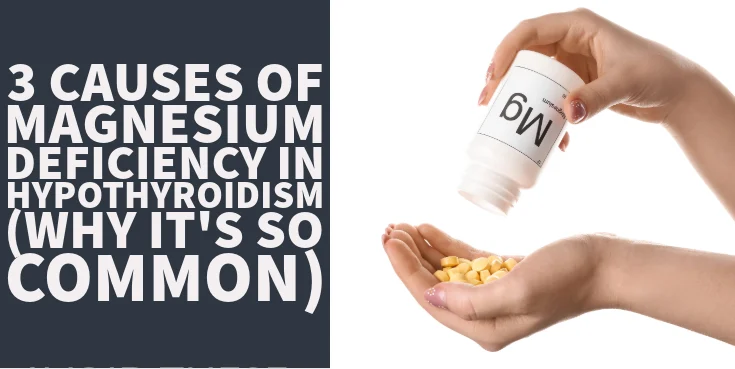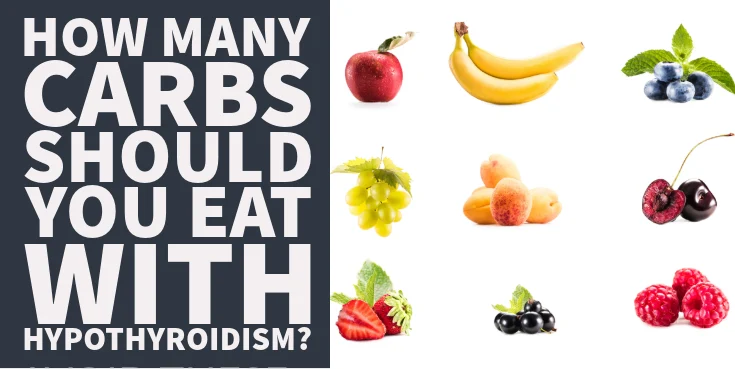The thyroid gland is a highly active tissue that requires a lot of nutrients to function at 100%.
One of those is a mineral called magnesium and it just so happens that most thyroid patients are not getting enough of it.
Why is it important?
Because your thyroid uses it to:
- Produce ATP to bring iodine into the thyroid gland (1) to create thyroid hormones like T3 and T4
- Support immune function and protect against thyroid antibodies (2)
- To create glutathione which protects the thyroid gland from oxidative stress and damage
- To regulate cortisol metabolism
So if you are someone who doesn’t like unnecessarily increasing your risk of developing autoimmune thyroid disease or exposing yourself to symptoms like fatigue, weight gain, depression, and brain fog, then paying to attention magnesium status is probably something that should be a priority.
And in order to make it a priority, you need to understand what causes you to become deficient.
Here are three reasons hypothyroid patients often end up magnesium deficient (and at the end of this article, I’ll give you the easiest way to increase it):
#1. Thyroid-Related Magnesium Metabolism & Excretion
The first has to do with the direct impact thyroid dysfunction has on the way that the body handles magnesium.
And while not completely understood, what we do know is that states of altered thyroid levels definitely impact how your body uses, absorbs, and excretes magnesium.
The research is all over the place and inconclusive (3), but it seems to suggest that hypothyroidism causes:
- Increased excretion of magnesium in the stool
- Decreased absorption of magnesium in the gut
- Changes in how magnesium is processed intracellularly
The net result of all of these changes is a higher rate of magnesium deficiency among those with hypothyroidism, Hashimoto’s thyroiditis, and hyperthyroidism.
#2. Stress-Related Magnesium Usage
On top of changes form thyroid function, hypothyroid patients also have to contend with the impact stress has on magnesium.
While under stress, the body will move magnesium from the inside of your cells (intracellular) to the outside of your cells (extracellular).
This movement in magnesium from the place it should be (inside of your cells) to the place you don’t want it, results in its excretion and elimination.
Unfortunately, as your body eliminates magnesium, it creates a situation where your body is more prone to stress by augmenting the release of stress hormones such as catecholamines (4) (epinephrine/adrenaline).
In other words, the more stressed you become and the more magnesium you lose, the more sensitive you are to stress the next time around.
This cycle continues and continues in a vicious cycle until you replace the lost magnesium and eliminate the source of stress.
If you can’t eliminate the stress then you better be replacing that lost magnesium level so that you can buffer your stress resiliency in the meantime.

This cycle is concerning enough on its own, but things get worse when you throw hypothyroidism into the mix.
The hypothyroid state, by virtue of its impact on cortisol, creates an environment where thyroid patients are far more sensitive to stress than the average person.
Part of this is probably due to the way thyroid dysfunction alters magnesium usage by the body, and the rest is certainly due to cortisol dysregulation from thyroid dysfunction.
Either way, the stress-related magnesium deficiency cycle is made worse in hypothyroid patients.
#3. Eating a Diet Devoid of Magnesium
This last reason isn’t necessarily specific to hypothyroid patients, but it’s still important nonetheless.
The sad truth is that the average person just doesn’t eat very healthily and statistics bear this out.
According to heaps of research, the average person eats a diet low in fruits and vegetables and high in fat and sodium (5).
And a significant portion of the food that is consumed is considered heavily processed and lacking in minerals like magnesium.
But even if your diet were to consist of real whole foods, it turns out it’s really hard to meet your daily needs of magnesium as someone without thyroid disease and even harder for those with hypothyroidism.
To drive this point home, consider this list of foods that are naturally high in magnesium (6) with their corresponding magnesium content per serving:
- Pumpkin seeds 156 mg/serving
- Chia seeds 111 mg/serving
- Almonds 80 mg/serving
- Spinach 78 mg/serving
- Peanuts 63 mg/serving
- Edamame 50 mg/serving
- Peanut butter 49 mg/serving
- Potato 43 mg/serving
- Yogurt 42 mg/serving
Other foods contain magnesium but at significantly lower levels, so they are not as important as those listed.
Now, let’s put this into perspective:
The average man requires 400 to 420 mg of magnesium per day and the average woman needs 310 to 320 mg per day.
This is just the bare minimum, by the way! It doesn’t account for the higher needs of hypothyroid patients or for depletion from stress and other factors.
If you were to eat the foods listed above to meet your daily needs, you’d want to consume:
- Pumpkin seeds
- Men: 2.69 servings/day
- Women: 2.05 servings/day
- Chia seeds
- Men: 3.78 servings/day
- Women: 2.88 servings/day
- Spinach
- Men: 5.38 servings/day
- Women: 4 servings/day
- Peanuts
- Men: 6.66 servings/day
- Women: 6.53 servings/day
Now let me ask you this…
Are you eating an average of 4-5 servings of spinach each day? How about 2-3 servings of pumpkin seeds each and every day?
As you can see, getting your magnesium needs from food alone is actually quite difficult.
Which is why it’s no surprise that some studies show that up to 80% of adults (7) do not meet their recommended daily intake of magnesium from their diet.
This all sounds depressing, but there’s an easy solution to this problem:
Magnesium supplements.
Need More Magnesium? Try Supplements
Magnesium supplements are considered an ace in the sleeve for hypothyroid patients because they offer an easy solution to their magnesium-prone state.
And because magnesium is cheap, widely available, and comes in many different forms (such as capsules, powders, bath salts, and topical sprays), there’s really no reason for thyroid patients to stay deficient in this critical nutrient.
Not all magnesium supplements are created equal, though, and some of the cheapest forms are often the least effective.
For this reason, and for best results, thyroid patients should stick to these forms:
- Magnesium glycinate chelate – this form of magnesium is bound to the amino acid glycine which enhances its absorption (8). This form is great for increasing magnesium in the entire body.
- Magnesium citrate – this form of magnesium is bound to citric acid and is the best form of magnesium to use if you suffer from constipation.
- Magnesium l-threonate – this form is great if you suffer from issues like brain fog, depression, headaches, anxiety, or migraines (9).
While supplements are an easy way to boost your magnesium status, they still don’t make up for the need to get as much as you possibly can from your diet.
A good way to approach your diet is to focus on real whole foods that you like to eat and that are palatable for you.
If they happen to be high in magnesium, great, but if they aren’t, just make up the difference with supplements.
Don’t force yourself to eat foods you don’t like, just for the sake of getting magnesium.
This is a recipe for disaster as you will most likely end up right back in old patterns and behaviors that will leave you worse off in the long run.
My personal recommendation would be to find a multivitamin that contains a few hundred milligrams of magnesium with additional thyroid-supporting nutrients.
Because the chances are high if you need magnesium, you probably also could benefit from the other ingredients found in a multivitamin.
Thyroid Daily Essentials, which fits the bill perfectly, was created specifically for thyroid patients and contains 175mg of magnesium per serving (as glycinate chelate) as well as 33 additional thyroid-supporting nutrients making it the ideal multivitamin for thyroid patients.
If you are already taking magnesium and want to make sure you’re taking the right kind then I would recommend reading this article next.
It discusses the best and worst forms of magnesium and explains the pros and cons of each type.
Scientific References
#1. ncbi.nlm.nih.gov/pmc/articles/PMC6996468/
#2. pubmed.ncbi.nlm.nih.gov/29967483/
#3. ncbi.nlm.nih.gov/pmc/articles/PMC292768/pdf/jcinvest00264-0105.pdf
#4. ncbi.nlm.nih.gov/books/NBK507250/
#5. ncbi.nlm.nih.gov/pmc/articles/PMC7721435/
#6. ods.od.nih.gov/factsheets/Magnesium-HealthProfessional/
#7. pubmed.ncbi.nlm.nih.gov/21669595/
#8. pubmed.ncbi.nlm.nih.gov/14596323/
#9. ncbi.nlm.nih.gov/pmc/articles/PMC9786204/








